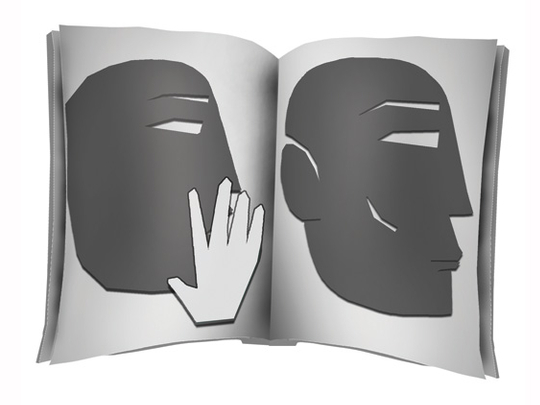
Earlier in the year, French author Vincent Nouzille published a groundbreaking book, Dans Le Secret des Presidents, which is selling like hot cakes in Beirut, especially after its excerpts were translated into Arabic and published by Lebanese daily As Safir.
The book, which is yet to be translated into English, reveals behind-the-scenes deals between world leaders, with a particular emphasis on the Arab world. Much of what it revealed is not new to the Arabs, about the animosity between US President Ronald Reagan and Libyan leader Muammar Gaddafi. It says, for example, that after the first Gulf War, George H. W. Bush contacted French President Francois Mitterand and told him that they will "dance in the streets of Baghdad" once the world is rid of Saddam Hussain.
The book struck a particular raw nerve in Lebanon, however, when it came to UN Security Council Resolution 1559, which it claims, Rafik Hariri knew of in advance. It also sheds light on the US-Franco rapprochement after the 2005 murder of Hariri, which culminated in a joint decision to bring down the Syrian government, and blame it for the Hariri Affair. Reportedly, Nouzille wrote his book after obtaining permission to go through official archives of the Elysee Palace, which is strange given that the French usually do not publish their official documents until 30-60 years have passed since their occurrence.
He also interviewed leading French and US politicians of the Jacques Chirac and George W. Bush eras, coming out with a picture that is grotesque — to say the least — about what political scientists usually refer to as "the game of nations".
The book reveals that contrary to the democratic image France and the US projected, the two countries were willing to intervene in the affairs of two sovereign states, with a completely straight face, toying with scenarios of regime change that resemble those of the 1950s.
In September 2003, for example, Bush and Chirac met on the sidelines of the UN General Assembly, six months after the Iraq War. Bush reportedly asked his French counterpart to warn President Bashar Al Assad of Syria to refrain from annoying the US, shortly after the State Department described the Syrian leader as a new Jamal Abdul Nasser whose ambitions "need to be contained". Nouzille adds that speaking to US Congressmen in March 2004, Chirac asked for joint efforts to reduce Syrian influence in Lebanon.
When Chirac and Bush dined on June 5, 2004, the French President mentioned upcoming presidential elections in Lebanon in October, asking for US support to bring about a Lebanese president independent of Syrian influence, thereby replacing President Emile Lahoud, and calling for sanctions on Syria in order to secure its speedy withdrawal from Lebanon.
The book adds that less than a week after Hariri's murder, the French and American ambassadors in Beirut concluded that Syria was responsible for the crime, without the slightest shred of evidence against the Syrians. Egyptian President Hosni Mubarak contacted Chirac to push for a similar argument while the French President was reportedly on the phone with Condoleezza Rice several times a week, to coordinate joint action on Lebanon, against Syria.
In one document, Chirac writes in black (with a red underline) of the need to incriminate Syria in Hariri's murder, in order to weaken, and eventually topple, the Syrian government. When Al Assad announced the withdrawal of Syrian troops from Lebanon in March 2005, Chirac reportedly tells Bush that "this is not enough because Syria will maintain strategic points in Lebanon". Chirac calls for more pressure on Damascus to isolate Syria and "get Hezbollah to distance itself" from Syria.
The book reminds us of earlier literature that rocked the Middle East, like Miles Copland's Game of Nations in which he confessed that the CIA had toppled Syria's democratically elected president Shukri Al Quwatli in 1949 and replaced him with a military dictator in order to make peace with Israel and approve passage of US oil pipelines through Syrian territory. The only difference is that usually when such groundbreaking information is revealed, it is done decades after events take place, when all players involved are long gone, and not just five years later, as is the case with Nouzille's book.
The timing of the book could not have been worse for the March 14 Coalition that is headed by current Prime Minister Sa'ad Hariri, who was staunchly pro-Chirac in 2005-2007. Many of its members built the entire legitimacy of their careers on the anti-Syrian policies bequeathed to them by France and US during the Bush and Chirac era.
The fact that Chirac was seemingly more anti-Syrian than Bush himself puts these March 14 figures in hot water, especially as Hariri today is trying to mend fences both with Syria and Hezbollah.
Additionally the Special Tribunal for Lebanon (STL) is currently on everybody's mind in Lebanon as indictments are expected to name Hezbollah members in the Hariri affair. Since last summer, Hezbollah leader Hassan Nasrallah has been telling the world that the STL is an "Israeli and American project" that cannot be trusted or supported, calling on the Lebanese people to boycott it, and the Lebanese state to distance itself from it.
Nouzille's book, if anything, adds credibility to Hezbollah's argument and proves its leader right.
Sami Moubayed is editor-in-chief of Forward Magazine in Syria.












